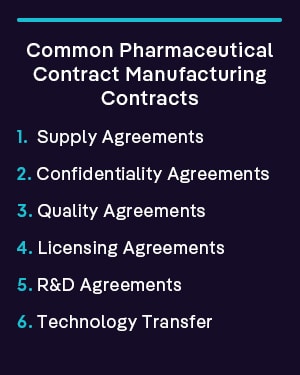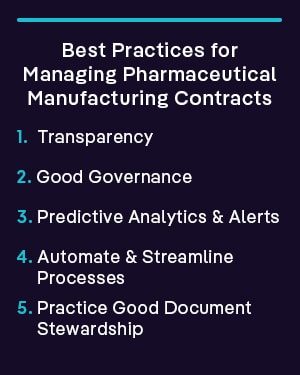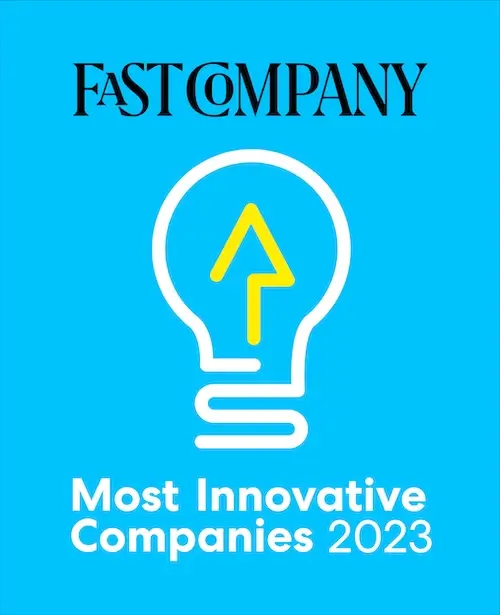The COVID-19 pandemic is widely regarded as a powerful catalyst for change and growth in the pharmaceutical contract manufacturing industry. The expertise, licensing, and resources required to develop and produce treatments and messenger ribonucleic acid (mRNA) vaccines are limited worldwide. Yet meeting the overwhelming global demand for these products and others is often too much for even these leading companies.
Over the past few years, strategic outsourcing relationships have helped to get more vaccines in arms and mitigate the impact of this highly infectious disease and its many variants.
What is Contract Manufacturing in the Pharmaceutical Industry?
Pharmaceutical contract manufacturing is the process in which one pharmaceutical company outsources the production of its products to a third-party manufacturer. The original manufacturer provides the formula and specifications for a drug product to a third party. It also articulates the revenue sharing, licensing, royalty-based, or other financial arrangements made between the parties. This relationship may be forged because the contract manufacturing organization (CMO):
- Can produce, package, and/or distribute a product at a lower cost or a greater scale than the drug patent holder
- The CMO is geographically closer to critical ingredients needed for production
- The country or region the CMO is located in is otherwise inaccessible to the contracting company due to political, patent, or strategic reasons
- The original manufacturer wants to focus on or contract out all or part of the research and development process
- The CMO specializes in sciences like cell and gene therapies or biopharmaceuticals (AKA biological drugs made from living organisms or their components like cells or proteins like mRNA)
- A CMO specializes in certain product types, like tablets, capsules, creams, or other liquids
According to a Research and Markets report, the U.S. was worth nearly $198 billion in 2022 and is forecast to grow to $337 billion by 2030. Many CMOs are selected for their expertise in certain elements of the pharmaceutical supply chain, such as testing, research, formulation development, packaging, or speed to market.
Common Pharmaceutical Contract Manufacturing Contracts
Supply Agreements 
A supply agreement gives an exclusive or semi-exclusive opportunity to a manufacturer to sell a pharmaceutical product to a buyer, such as a retailer, wholesaler, or distributor.
These kinds of agreements usually include terms related to quality, safety, regulatory compliance, confidentiality, shipping, and handling. It will typically outline how disputes over the terms above or intellectual capital-related matters will be sorted out. They ensure a regular supply of certain medications to the market.
Manufacturing Agreements
Some pharmaceutical companies want to focus on drug development or pharmaceutical product marketing that addresses a common health concern but aren’t interested in producing it in-house. So they enter into a manufacturing agreement with a CDMO or CMO to focus on their core competency or ensure enough of the product gets to market to fulfill their supply agreements.
Confidentiality Agreements
There is no question – pharmaceutical industry leaders stake their success on confidentiality. The research and development work that goes into getting a drug through clinical trials to the licensing and patent stage, and finally to market often takes about fifteen years.
That means CMOs often must sign a confidentiality or non-disclosure agreement (NDA) years before they start shipping the product to market, so the negotiations and enforcement related to these agreements must be thorough. Many CMOs like Terumo adopt AI-powered contract lifecycle management (CLM) platforms to author and review confidentiality agreements and the other contract types described here. Some pharmaceutical companies are using blockchain ledger systems to securely communicate with their supply chain partners because data breaches can make a manufacturer lose their licensing opportunity or devalue many years of engineering work.
Quality Agreements
If a pharmaceutical product doesn’t meet the highest quality standards, it could result in the drug not safely delivering its intended benefit. In other words, it could result in unexpected side effects, suffering, or even death. A quality agreement outlines quality parameters like the purity, potency, safety, and identity of the product.
There are four types of quality agreements: manufacturing, supplier, vendor, and service quality, all of which pertain to different types of manufacturing outsourcing relationships:
- Manufacturing quality contracts define how a CMO must adhere to formulation standards, storage and transport terms, label printing, and third-party good manufacturing policy (GMP) audits.
- Supplier, vendor, and service quality agreements lay out the terms and conditions related to the quality of materials or services a manufacturer uses to produce their medication or biopharmaceutical materials.
These contracts will contain the quality metrics and remedies governing the end-to-end relationship. A pharmaceutical company can get into regulatory compliance jeopardy from bodies like the U.S. Food and Drug Agency (FDA) for not having quality agreements in place. Or for not meeting FDA quality standards and policies with their product quality standards.
Licensing Agreements
Outsourcing manufacturing in medical arenas like cellular and gene therapy involves a lot of exclusively and jointly owned intellectual property (IP). Defining who owns what, for how long, and what happens if the IP is compromised is impossible to cover in a “one-size-fits-all” contract. IP ownership is often determined by who invented a pharmaceutical product.
A contract manufacturing licensing agreement defines the nature of the product invention and if the pharmaceutical company/customer will assume IP ownership or they will share it with their CDMO partner.
R&D Agreements
Pre-clinical research, development, clinical testing, and discovery require state-of-the-art equipment, highly experienced scientists, and a great deal of money. CDMOs and their customers both incur a measure of risk when working to bring a pharmaceutical product to market. Painstakingly creating, vetting, and negotiating iron-clad, complex contracts often come with the territory of these relationships. Automating as much of this process as possible can be a real competitive edge.
R&D agreements must demonstrate an understanding of each party’s goals, policies, and obligations in the relationship. They have to be understandable, enforceable, and trackable. An AI-powered CLM platform with an analytics engine and a virtual assistant function can help track obligations and milestones. It also ensures the language can be understood and is enforceable.
Technology Transfer Contracts
Pharmaceutical technology transfer includes the required processes for getting drugs through these phases:
- Pre-clinical Discovery
- Product development
- Pre-approval clinical trials and FDA certification
- Commercialization
In other words, it is how a CDMO or contract research organization (CRO) makes its technology available to a customer for processes like formulation development, quality assurance, manufacturing, and packing production.
Best Practices for Managing Your Pharmaceutical Manufacturing Contracts
Transparency
Successful pharmaceutical outsourcing agreements are those which ensure key stakeholders from both parties have visibility across R&D, manufacturing, marketing, operations, and legal.
Good Governance
Regulatory organizations like the FDA, Health Canada, and the Medicine and Healthcare Products Regulation industry in the UK demand that pharmaceutical companies and their CMO/CRO partners follow strict yet evolving standards. These standards are related to consumer safety, drug purity, and corporate accountability. Violating them can incur huge fines and serious reputational harm.
Predictive Analytics and Alerts
Don’t miss key milestones like renewal dates or obligations like clinical trial submissions. Set up notifications to follow up with customers or CMOs to ensure you are meeting your delivery commitments and prepared for quality audits.
Automate and Streamline Processes
Creating a library of approved contract terms and automating complex contract assembly and review can accelerate contract negotiation cycles while protecting your company from terms and conditions you can’t or shouldn’t live up to.
Practice Good Document Stewardship Practices
Use 21 CFR Part 11 compliant contract review and approval processes. Invest in a contract management platform with a repository that can manage contracts through their full lifecycle, including version control, redlining, digital rights management, and audit trails.
Simplify Contract Management with ContractPodAi
Pharmaceutical companies employ many people across their enterprise that interacts with their contracts. The next several years will see meteoric growth in the pharmaceutical contract management industry. Healthcare institutions, payers, consumers, and government entities are looking for more effective, innovative, yet affordable ways to address healthcare needs ranging from viral diseases and mental disorders to genetic and cellular therapy.
Whether your pharmaceutical company contracts CDMOs, CROs, and CMOs, or if you are a CMO executive yourself, ensure your organization has the tools it needs to protect and grow your business. A contract lifecycle management platform offers many tools for increasing efficiency and productivity while ensuring your business complies with regulatory and legal standards.
Watch our latest webinar, Drive Contract Visibility and Empower Legal and the Broader Enterprise










